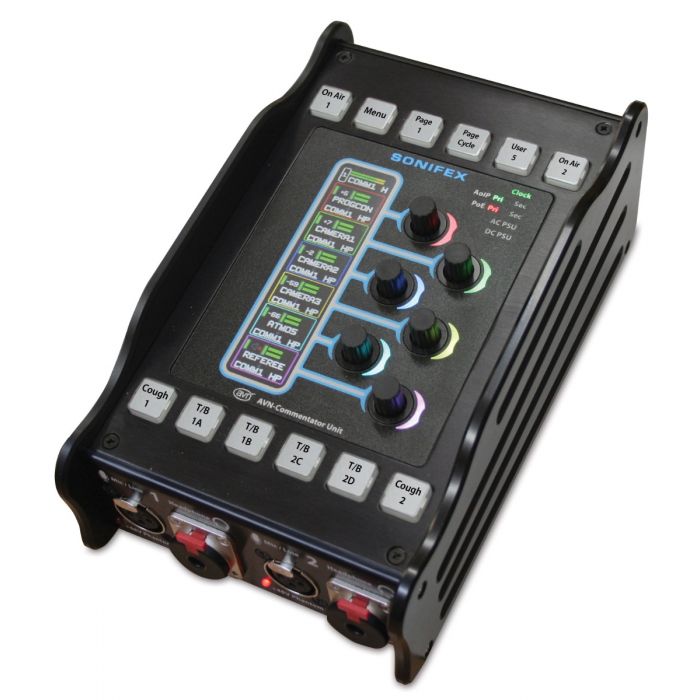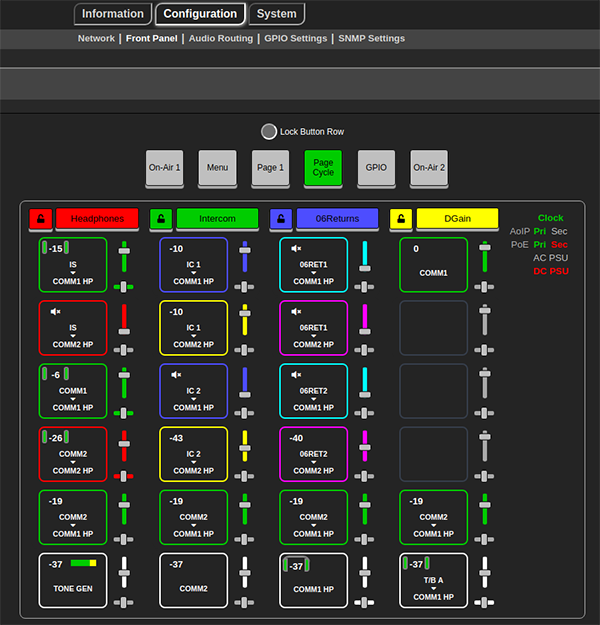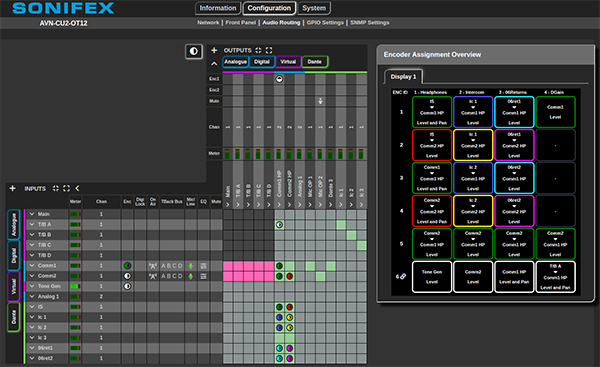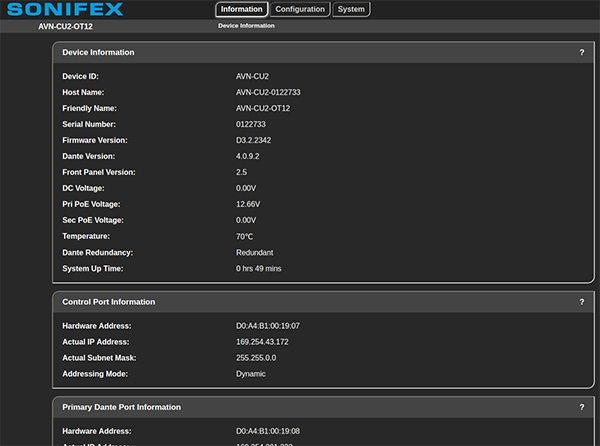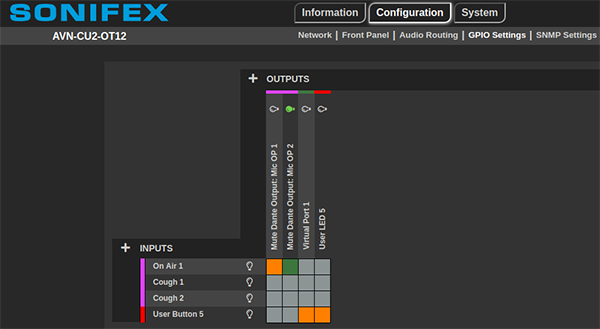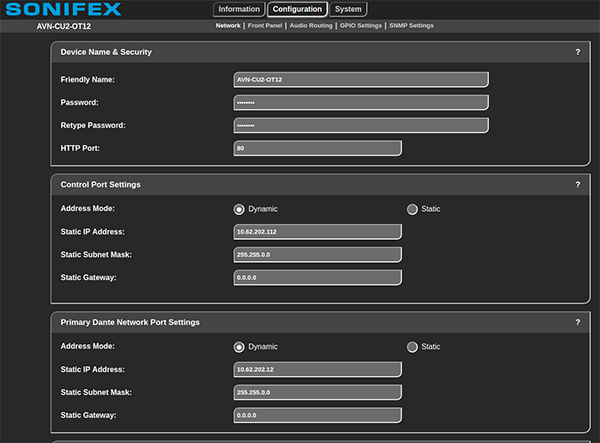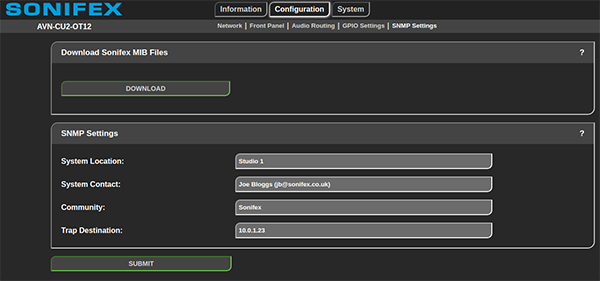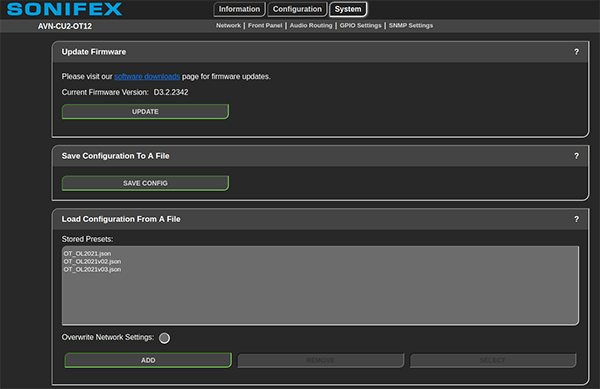Sonifex AVN-CU2-DANTE 2 Mic/Line Input Commentator Unit Dante

AVN-CU2-DANTE Configurable Dante Commentary Unit for 2 Commentators
The AVN-CU2-DANTE takes a new approach to provide a multi-purpose configurable tool for commentary teams. Its power lies in the impressive mix engine which overlays the usual Dante® Controller settings. Once Dante® flows have been made, inputs and outputs can be mixed freely to AoIP or physical inputs and outputs, controlled using the programmable buttons and rotary encoders, which control the gain and pan of inputs, outputs or cross-points, allowing total flexibility for different situations.
It can be used in any number of different commentary situations, controlled manually or remotely and controls can be ‘locked down’ so that they can’t be tampered with or altered, to guarantee reliable operation. Housed in a rugged and intuitive, user-friendly package, it’s a truly different way of looking at how commentary units should operate.
Sonifex 2 Mic/Line Input Commentator Unit Dante - AVN-CU2-DANTE
Traditional commentary units have fixed analogue and digital I/O and fixed controls in fixed positions on the unit. Their inputs and outputs are defined at hardware design and are thus limited by that initial design, including limited routing, mixing and DSP of the audio pathways.
We’ve taken a different approach with the AVN-CU2-DANTE. It was designed from the ground up to be totally flexible in operation and the use of Dante AoIP means that inputs and outputs can be added as required (up to a max of 16 per unit). Because any physical analogue or digital input can be mixed and routed with any Dante AoIP input to any physical output or Dante output, you can define your own audio pathways. Additionally, you can choose which of those pathways need to be controlled (volume and pan) by the use of rotary encoders. Using a built-in web GUI, up to 4 nameable pages of 6 rotary encoders (24 in total) can be placed on the mixing matrix at inputs, outputs or cross-points. Each rotary encoder has a separate colour-coded meter section showing the channel name, detailed level metering and left/right panning on a bright daylight reading display. Colours can be programmed per encoder to quickly identify particular source groups, so headphone source selection becomes intuitive.
The AVN-CU2-DANTE provides two mic/line inputs with a wide, adjustable gain range and has two stereo headphone outputs with lockable jack sockets, suitable for operation by two commentators.
It’s powered using Power over Ethernet (PoE), using Neutrik EtherCON connectors, with primary and secondary ports for power and data redundancy. There’s an additional 4 pin XLR 12V DC input. The unit supports up to 16 input and output AoIP channels and up to 16 simultaneous input and output AoIP streams.
The 6 push-button rotary encoders control input and output levels and panning. The 12 key-cap buttons are fully configurable for any button function.
Metering is available per input/output, with output metering configurable as pre or post level adjustment. The top of the display shows output metering, a limiter indication and the name of the output. An adjustable limiter is available on every output and is applied automatically to prevent signal clipping.
The unit has 2 x locking mic/line inputs with +48V phantom power indication and 2 x headphone outputs on locking 6.35mm jack sockets.
Four-wire I/O on rear panel RJ45 connectors provide an AES3 or analogue input and output that can be assigned as mic outputs (line level), talkback outputs, programme inputs or talkback inputs as desired.
In addition, the AES/analogue connections can be used as an insert or exit point into/out from the AoIP network.
The unit has dual redundant network ports on both RJ45 (PoE using 2 x Neutrik EtherCON® connectors) and SFP cages for long fibre runs.
There are 10 x configurable GPIO on a 15-way D-type connector with 1 x switched changeover output.
All of the buttons have the key-cap text and can be configured. There are some standard operations available:
- 2 x On-Air buttons can be used to connect mic audio to the main output, either over AoIP or via the AES digital audio connection. The On-Air buttons can be locked if required.
- A Menu button can be used to access limited setup options on the TFT display.
- 2 x Page buttons change the display and encoders to monitor an additional set of sources, mix points or outputs. Up to 4 pages can be pre-programmed, e.g. one for talkback inputs, one for outputs, one to monitor other sources.
- 2 x Cough buttons take the commentator off-air while pressed.
- A User button can be programmed to perform any function using the webserver.
- 4 x T/B (talkback) buttons can be configured to initiate talkback over AoIP or AES digital audio connection, using 4 x talkback busses. The talkback buttons operate with lazy talkback, taking the commentator off-air when invoked.
- 6 x rotary encoders.
- 4 x pages of 6 rotary encoder positions (24 in total).
The illuminated ‘Sonifex’ logo acts as a power indication and there are illuminated LEDs to indicate network clock status, AoIP Primary and AoIP Secondary link status, PoE Primary, PoE Secondary and DC power active.
SPECIFICATIONS
Network and AoIP |
|
| AoIP Standard: | Dante |
| Number of Channels: | 16 receive, 16 transmit |
| Number of Streams: | 16 receive, 16 transmit |
| Sample Rate: | 48 kHz |
| Format: | Linear PCM, 16, 24 or 32 bit |
| AES67 Support: | Yes |
| Connectivity: | 2 x RJ45 and 2 x SFP |
| Speed: | 1Gbps or 100Mbps |
| Network Modes: | Switched or redundant |
| Dante Domain Manager Ready: | Yes |
Mic/Line Inputs |
|
| Input Impedance (Mic Mode): |
2.5kΩ electronically balanced |
| Input Impedance (Line Mode): |
>10kΩ electronically balanced |
| Preamp Gain (Mic Mode): |
User selectable 16dB to 76dB in 3dB steps (Ref. +18dBu = 0dBFS) |
| 0dBFS Line-up (Mic Mode): |
-58dBu @ Max preamp gain, +2dBu @ Min preamp gain |
| 0dBFS Line-up (Line Mode): |
User selectable +15dBu / +18dBu / +20dBu / +22dBu / +24dBu = 0dBFS |
| Frequency Response (Mic Mode): |
+0/-0.2dB 20Hz to 20kHz Ref 40dB gain @ 1kHz |
| Frequency Response (Line Mode): |
+0/-0.2dB 20Hz to 20kHz Ref 0dBu @ 1kHz |
| THD+N (Mic Mode): |
<-90dBFS, -64dBFS, 20Hz – 20kHz, 40dB gain, 20kHz BW |
| THD+N (Line Mode): |
<-98dBFS, -30dBFS, 20Hz – 20kHz, 20kHz BW |
| Equivalent Input Noise (Mic Mode): |
125dB Ref. 76dB preamp gain, Rs = 200Ω |
| Noise (Line Mode): |
<-100dBFS, 20kHz BW, Rs = 200Ω |
| C.M.R.R. | >60dB @ 1kHz |
| Phantom Power (Mic Mode): |
+48V |
| High Pass Filter: | 12dB/octave, user selectable frequency |
Stereo Analogue/Digital Input |
|
| Input Impedance (Analogue Mode): |
>20kΩ electronically balanced |
| Input Impedance (Digital Mode): |
110Ω |
| Supported Input Rates (Digital Mode): |
32kHz, 44.1kHz, 48kHz, 88.2kHz, 96kHz, 176.4kHz and 192kHz |
| 0dBFS Line-up (Analogue Mode): |
User selectable +15dBu / +18dBu / +20dBu / +22dBu / +24dBu = 0dBFS |
| Frequency Response (Analogue Mode): |
+0/-0.2dB 20Hz to 20kHz Ref 0dBu @ 1kHz |
| THD+N (Analogue Mode): |
<-107dBFS, -30dBFS, 20Hz – 20kHz, 20kHz BW |
| Noise (Analogue Mode): |
<-108dBFS, 20kHz BW, Rs = 200Ω |
| C.M.R.R (Analogue Mode): |
>60dB @ 1kHz |
Stereo Analogue/Digital Output |
|
| Output Impedance (Analogue Mode): |
<50Ω |
| Output Impedance (Digital Mode): |
110Ω |
| Supported Output Rates (Digital Mode): |
48kHz |
| 0dBFS Line-up (Analogue Mode): |
User selectable 0dBFS = +15dBu / +18dBu / +20dBu / +22dBu / +24dBu |
| Frequency Response (Analogue Mode): |
+0/-0.5dB 20Hz to 20kHz Ref 0dBu @ 1kHz |
| THD+N (Analogue Mode): |
<-107dBFS, -30dBFS, 20Hz – 20kHz, 20kHz BW |
| Noise (Analogue Mode): |
<-107dBFS, 20kHz BW |
Headphone Outputs |
|
| Drive Capability | Drives 150mW into 32Ω to 600Ω headphones |
| 0dBFS Line-up: | Fixed 0dBFS = +18dBu |
| Frequency Response: | +0/-0.2dB 20Hz to 20kHz Ref 0dBu @ 1kHz |
| THD+N: | <-107dBFS, -30dBFS, 20Hz – 20kHz, 20kHz BW |
| Noise: | <-110dBFS, 20kHz BW |
Main Panel Operational Controls & Indicators |
|
| Power LED | Sonifex logo illuminates when power is present |
| Pushbuttons: | 12 x Illuminated buttons that can be assigned to any of the following functions, and configured: On-Air / Talkback / Page # / Page Cycle / GPO / Cough / Menu / Brightness |
| Display: | 480 x 107 pixel colour TFT display showing pan status, level, metering, control type, source/mix/destination names and main output metering |
| Status LEDs: | Clock / AoIP status / PoE status and PSU status LEDs to monitor power and connectivity. Can be disabled if required |
| Rotary Encoders: | 6 x robust soft touch rotary encoders with adjacent configurable light bars for group/source/commentator grouping and identification |
Front Panel Connections |
|
| Headphone Outputs: | 2 x Neutrik ¼” (6.35mm) locking jack sockets |
| Microphone/Line Inputs: | 2 x Neutrik 3 pin latching XLR sockets |
Rear Panel Connections |
|
| Stereo Analogue/Digital Input: | RJ45 socket (electronically balanced) |
| Stereo Analogue/Digital Output: | RJ45 socket (electronically balanced) |
| GPIO Port: | 15-way ‘D’-type socket |
| DC Input: | Neutrik 4 pin XLR plug, 12VDC, Maximum 12W |
| Network: | 2 x 1Gbps Neutrik EtherCON receptacles, with PoE 2 x SFP slots for alternative interfaces |
PoE Power |
|
| Standard | 802.3af |
| Class | 0 |
| PD Power Range | 0.44 W to 12.94 W |
| Typical PSE Power Usage | 13 W |
| Max PSE Power Usage | 15.4 W |
Equipment Type |
|
| AVN-CU2-DANTE | Dante® Commentator Unit, 2 Commentators |
Physical Specification |
|
| Dimensions (Raw): | 13.5cm (W) x 23cm (D) x 9.0cm (H - rear) 6.6cm (H - Front) 9.3cm (H - Maximum) 5.3” (W) x 9” (D) x 3.5” (H - front) x 2.6” (H - rear) 3.7" (H - Maximum) |
| Dimensions (Boxed): | 30.5cm (W) x 21.5cm (D) x 16.3cm (H) 12" (W) x 8.5" (D) x 6.4" (H) |
| Weight: | Nett: 1.8kg Gross: 2.1kg Nett: 3.96lbs Gross: 4.62lbs |
Accessories |
|
| AVN-DCX60 | DC Power Supply for AVN Range, 4 pin XLR socket, 60W |
| AVN-TC1 (Case Only) | Transport Case, AVN-CU2-DANTE & Power Supply Cut-out |
| CM-GM2: | Professional Gooseneck Condenser Microphone |
It can be used in any number of different commentary situations, controlled manually or remotely and controls can be ‘locked down’ so that they can’t be tampered with or altered, to guarantee reliable operation. Housed in a rugged and intuitive, user-friendly package, it’s a truly different way of looking at how commentary units should operate.
Traditional commentary units have fixed analogue and digital I/O and fixed controls in fixed positions on the unit. Their inputs and outputs are defined at hardware design and are thus limited by that initial design, including limited routing, mixing and DSP of the audio pathways.
We’ve taken a different approach with the AVN-CU2-DANTE. It was designed from the ground up to be totally flexible in operation and the use of Dante AoIP means that inputs and outputs can be added as required (up to a max of 16 per unit). Because any physical analogue or digital input can be mixed and routed with any Dante AoIP input to any physical output or Dante output, you can define your own audio pathways. Additionally you can choose which of those pathways need to be controlled (volume and pan) by the use of rotary encoders.
Using a built-in web GUI, up to 4 nameable pages of 6 rotary encoders (24 in total) can be placed on the mix matrix at inputs, outputs or cross-points. Encoders can control the volume and pan of headphones and volume of inputs, outputs or cross-points. Each rotary encoder has a separate colour-coded meter section showing the channel name, detailed level metering and left/right panning on a bright daylight reading display. Colours can be programmed per encoder to quickly identify particular source groups, so headphone source selection becomes intuitive.
AVN-CU2 Web GUI Front Page
The unit can be fully remotely controlled from the web interface, which mimics the front panel of the unit and includes live metering. All the controls can be operated as if at the unit and there are front-panel lock-out options for every button and encoder, with ‘quick lock-out’ for the rows of buttons and pages of encoders. This allows you to configure the unit for simple operation by the talent but with more complex setups, say, for mixing the talkback or feeds from an OB truck.
The AVN-CU2-DANTE provides two mic/line inputs with a wide, adjustable gain range and has two stereo headphone outputs with lockable jack sockets, suitable for operation by two commentators.
It’s powered using Power over Ethernet (PoE), using Neutrik EtherCON® connectors, with primary and secondary ports for power and data redundancy. There’s an additional 4 pin XLR 12V DC input. The unit supports up to 16 input and output AoIP channels and up to 16 simultaneous input and output AoIP streams.
The 6 push-button rotary encoders control input and output levels and panning. The 12 key-cap buttons are fully configurable for any button function and can have different colours for the on and off functions.
Metering is available per input/output, with output metering configurable as pre or post level adjustment. The top of the display shows output metering, a limiter indication and the name of the output. An adjustable limiter is available on every output and is applied automatically to prevent signal clipping.
The unit has 2 x locking mic/line inputs with +48V phantom power indication and 2 x headphone outputs on locking 6.35mm jack sockets.
Fourwire I/O on rear panel RJ45 connectors provide an AES3 or analogue input and output that can be assigned as mic outputs (line level), talkback outputs, programme inputs or talkback inputs as desired. In addition, the AES/analogue connections can be used as an insert or exit point into/out from the AoIP network.
The unit has dual redundant network ports on both RJ45 (PoE using 2 x Neutrik EtherCON® connectors) and SFP cages for long fibre runs.
There are 10 x configurable GPIO on a 15 way D-type connector with 1 x switched changeover output. GPIO & VGPIO (virtual GPIO, i.e. network commands) can be configured on a matrix to visually show actions, combined with button presses and event triggers, such as input/output muting, which enables some automation. Button presses can control buttons and functions on other network connected AVN-CU units using VGPIO.
The complete configuration of the unit, including all encoder settings, button setups and Dante mix matrix audio routes, can be saved off to a text editable .json file. Up to 8 of these files can be stored on the unit and loaded from the main Menu, meaning that the unit can be pre-configured for any venue, or event and with these setups instantly recalled onsite.
All of the buttons have key-cap text and can be configured for any button in any position. There are some standard operations available:
- 2 x On-Air buttons can be used to connect mic audio to the main output, either over AoIP or via the AES digital audio connection. The On-Air buttons can be locked if required.
- A Menu button can be used to access limited setup options on the TFT display.
- 2 x Page buttons change the display and encoders to monitor an additional set of sources, mix points or outputs. Up to 4 pages can be pre-programmed, e.g. one for talkback inputs, one for outputs, one to monitor other sources.
- 2 x Cough buttons take the commentator off-air while pressed.
- A User button can be programmed to perform any function, using the web server.
- 4 x T/B (talkback) buttons can be configured to initiate talkback over AoIP or AES digital audio connection, using 4 x talkback buses. The talkback buttons operate with lazy talkback, taking the commentator off-air when invoked.
- 6 x rotary encoders.
- 4 x pages of 6 rotary encoder positions (24 in total).
The illuminated ‘Sonifex’ logo acts as a power indication and there are illuminated LEDs to indicate network clock status, AoIP Primary and AoIP Secondary link status, PoE Primary, PoE Secondary and DC power active.
AVN-CU2 Audio Routing Page
AVN-CU2 Dev Info Page
AVN-CU2 GPIO Page
AVN-CU2 Network Page
AVN-CU2 SNMP Page
AVN-CU2 System Page

